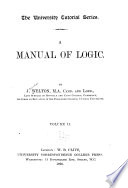 | William Fleming - 1890 - 458 pages
...that a cause may operate. 111 the language of Inductive Logic, the cause is defined as " the sum-total of the conditions positive and negative taken together...the contingencies of every description, which, being realised, the consequent invariably follows. But it is common to single out one only of the antecedents,... | |
 | William Minto - 1893 - 420 pages
...word cause in a different meaning from that of ordinary speech. It is quite true that " the cause, philosophically speaking, is the sum total of the...the contingencies of every description, which being realised, the consequent invariably follows". But this does not imply any discrepancy between the scientific... | |
 | John Watson - 1895 - 492 pages
...facts which must be absent if the consequent is to take place. The full definition of cause, therefore, is, "the sum total of the conditions, positive and negative, taken together, upon which the consequent invariably follows." This view of causation does away with the absolute distinction... | |
 | James Welton - 1896 - 374 pages
...philosophically speaking, " no right to give the name of cause to one of them, ex" clusively of the others. . . . The cause, then, philosophically " speaking, is the...consequent " invariably follows. The negative conditions . . . may all " be summed up under one head, namely, the absence of " preventing or counteracting causes... | |
 | William Gay Ballantine - 1896 - 202 pages
...where experiment is impossible, some name should be found more appropriate than " experimental." tions positive and negative taken together, the whole of...being realized, the consequent invariably follows." But the methods never isolate a cause in this sense ; it is only the empirical cause — some single... | |
 | William Gay Ballantine - 1896 - 200 pages
...which Mr. Mill asserts invariability of succession are states of the universe. "The cause," he says, "is the sum total of the conditions, positive and...whole of the contingencies of every description." "The state of the whole universe at any instant, we believe to be the consequence of itsj state at... | |
 | John Watson - 1898 - 526 pages
...which / must be absent if the consequent is to take place. The / full definition of cause, therefore, is, "the sum total of/ the conditions, positive and negative, taken together, j upon which the consequent invariably follows." This view of causation does away with the absolute... | |
 | Leslie Stephen - 1900 - 542 pages
...cause must include all the relevant phenomena. The cause, therefore, is, ' philosophically speaking,' the ' sum total of the conditions,' positive and negative,...the contingencies of every description, which, being realised, the consequent invariably follows.'2 Mill's second amendment is made by saying that the cause... | |
 | John Kells Ingram - 1901 - 142 pages
...numerous, that determines the effect. As JS Mill says, in his Logic (Bk. in., chap. 5), " the cause, philosophically speaking, is the sum total of the....the contingencies of every description, which being realised, the consequent invariably follows." And hence he goes into lengthened explanations as to... | |
 | James Mark Baldwin - 1902 - 946 pages
...pluralité des causea ; Ital. John Stuart Mill, in his System of Logic, III. v. 3, argues that -'the cause, philosophically speaking, is the sum total of the...being realized, the consequent invariably follows.' This has been called the doctrine of ' Plurality of Causes/ This doctrine was not at all new when Mill's... | |
| |